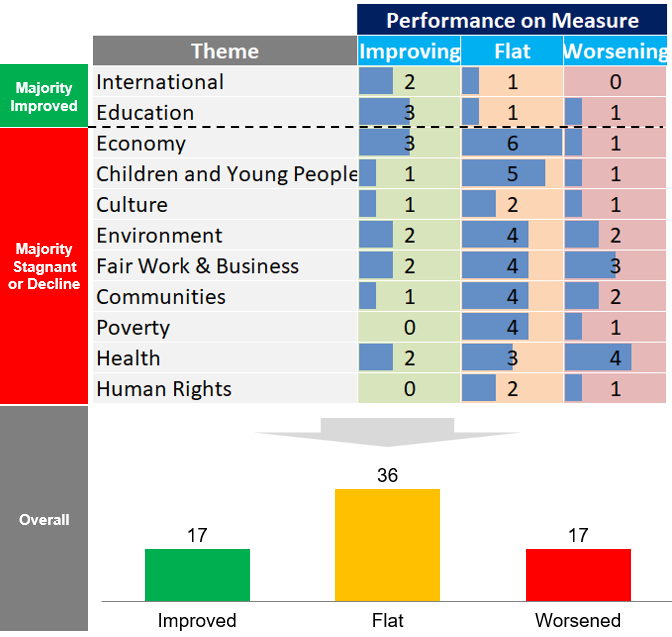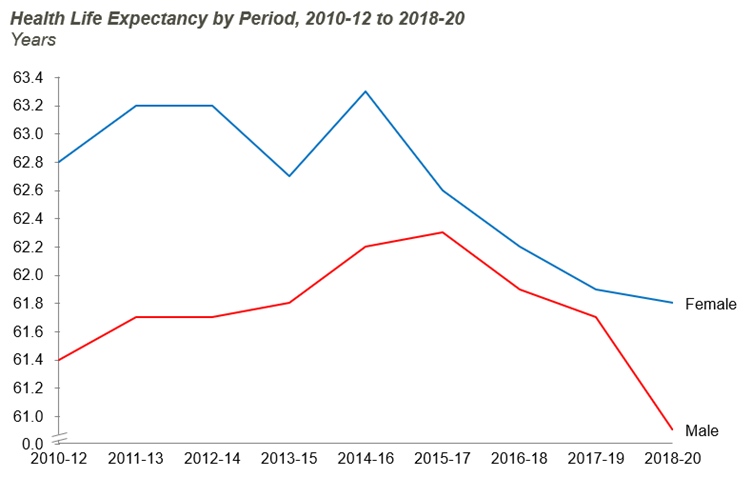
Jamie Gollings
Jamie Gollings is a Research Officer at Our Scottish Future
Today Nicola Sturgeon will take her podium in the Holyrood chamber for her final First Minister’s Questions. Like many members of the parliament will surely do, Our Scottish Future has taken that as an opportunity to reflect on the legacy of Scotland’s longest serving First Minister.
Our analysis is based on the data included in the Scottish Government’s National Performance Indicator (NPI) framework. These are the measures which the government is pinning its colours to. Below, we lay out these measures along with the assessment of performance given on the NPI’s website.

The picture they paint is one of stagnation. Over half of the measures are labelled as ‘Performance Maintaining’ (here noted as ‘flat’), with only a quarter showing any improvement in the most recent period.
There are two areas where the majority of measures were deemed to have improved, including on education, the area on which Nicola Sturgeon wished to be judged. The positive results here are all about skills in the workforce, with the skill profile of the population, skills shortages and skill underutilisation all improving. What is missing from the education dataset is a conclusion on performance of those of schooling age, due to the pandemic. Looking at the data underneath it, the results there appear to be mixed, but mostly static. A look at broader educational data, however, would give a more damning picture – especially from the final set of PISA data, where Scotland relinquished its place as the highest performing part of the UK on the measures over the last decade.
The international measures are another relative bright spot, with 2 out of 3 showing improvement. Scotland’s international ‘brand’ has been enhanced according to polling, and the number of councils with a declining population has fallen, although over the longer term the picture is more variable.
Outside of these two areas, the results are less positive.
Successive polls tell us that the NHS and economy are Scots’ top priorities. The performance here on health measures is poor. Life expectancy has been falling since around the time that Nicola Sturgeon assumed the role, even before Covid. Mental wellbeing is worse. Rates of premature mortality are higher in every year after 2014.

Scots’ quality of experience in the NHS is falling off a cliff. In 2015 85% of those surveyed thought the quality of service provided by their GP was good or excellent. By 2019, this was the view of 79%. After the impact of the pandemic, this had dropped off to just 67%.
On the economy, good news can be found on three of the NPI measures. Greenhouse gas emissions are falling (a measure which sits in the economy and not the environment category for reasons which are unclear); exports are growing, although the NPI uses the nominal rather than real measure; and superfast broadband is reaching more addresses.
Elsewhere, the economic growth measure is clearly down, and many of the drivers of economic growth have stagnated: R&D spend, entrepreneurial activity and their chosen measure of productivity are all flat. This chosen measure is an unusual one – it looks at Scotland’s productivity ranking vs other countries. If we looked instead at Scotland’s performance compared to other nations and regions of the UK, it had the slowest productivity growth.
Adjacent to the economy is the ‘Fair Work & Business’ category, where the NPI results are more mixed. Excellent progress has been made on closing the gender employment gap in Scotland, and more employees are benefiting from wages above the Living Wage level. The business sector has, however, faded since 2014 – again, the drivers of economic growth and productivity are of concern. The number of high growth businesses, and of innovative businesses has both declined, as has the stock of businesses overall.
Communities policy is another area of stagnation. The downward trend in the crime rate has levelled off. People’s perceptions of their local areas isn’t shifting. Social capital is weakening, as is access to places where citizens can interact with each other.
In area after area, we see that Scotland is a country in stasis. By the Scottish Government’s own selection of measures, it is making Scottish lives better on just under a quarter of them. What is the rest of the First Minister’s machinery of state achieving? For the healthcare system, for businesses, for children, the answer is the same. At its best, it is treading water.










